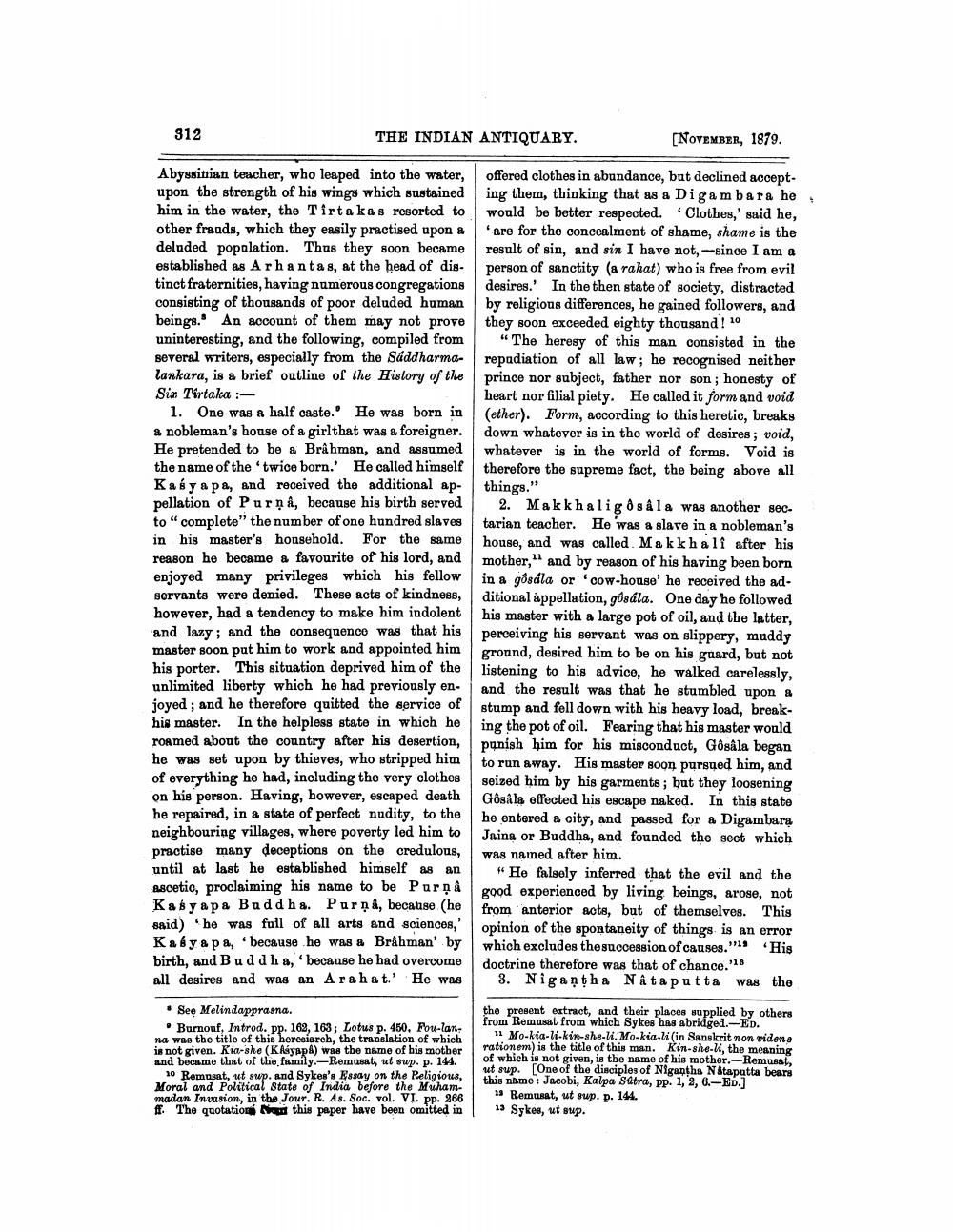________________
312
THE INDIAN ANTIQUARY.
[NOVEMBER, 1879.
Abyssinian teacher, who leaped into the water, upon the strength of his wings which sustained him in the water, the Tirta kas resorted to other frauds, which they easily practised upon & delnded popalation. Thus they soon became established as Arhantas, at the head of dig. tinct fraternities, having numerous congregations consisting of thousands of poor deluded human beings. An account of them may not prove uninteresting, and the following, compiled from several writers, especially from the Saddharmalankara, is a brief outline of the History of the Siz Tirtaka :
1. One was a half caste. He was born in a nobleman's house of a girlthat was a foreigner. He pretended to be a Brâhman, and assumed the name of the twice born.' He called himself Kas y apa, and received the additional ap- pellation of Purņa, because his birth served to complete" the number of one hundred slaves in his master's household. For the same reason he became a favourite of his lord, and enjoyed many privileges which his fellow servants were denied. These acts of kindness, however, had a tendency to make him indolent and lazy; and the consequence was that his master soon put him to work and appointed him his porter. This situation deprived him of the unlimited liberty which he had previously enjoyed; and he therefore quitted the service of his master. In the helpless state in which he roamed about the country after his desertion, he was set upon by thieves, who stripped him of everything he had, including the very clothes on his person. Having, however, escaped death he repaired, in a state of perfect nudity, to the neighbouring villages, where poverty led him to practise many deceptions on the credulous,
redulous, until at last he established himself as an Ascetio, proclaiming his name to be Purņa Kasyapa Buddha. Purna, because (he said) he was full of all arts and sciences, Kafya pa, because he was a Brahman' by birth, and Buddha, because he had overcome all desires and was an Arahat.' He was
offered clothes in abundance, but declined accepting them, thinking that as a Digambara he would be better respected. Clothes,' said he,
are for the concealment of shame, shame is the result of sin, and sin I have not, --since I am a person of sanctity (a rahat) who is free from evil desires. In the then state of society, distracted by religious differences, he gained followers, and they soon exceeded eighty thousand ! 10
"The heresy of this man consisted in the repudiation of all law; he recognised neither prince nor subject, father nor son; honesty of heart nor filial piety. He called it form and void (ether). Form, according to this heretic, breaks down whatever is in the world of desires; void, whatever is in the world of forms. Void is therefore the supreme fact, the being above all things."
2. Makkhaligð sála was another sectarian teacher. He was a slave in a nobleman's house, and was called Makkhali after his mother," and by reason of his having been born in a gôsála or cow-house' he received the additional appellation, gôsála. One day he followed his master with a large pot of oil, and the latter, perceiving his servant was on slippery, muddy ground, desired him to be on his guard, but not listening to his advice, he walked carelessly, and the result was that he stumbled upon a stump and fell down with his heavy load, breaking the pot of oil. Fearing that his master would punish him for his misconduct, Gösâla began to run away. His master goon pursued him, and seized him by his garments; but they loosening Gôsâla effected his escape naked. In this state he entered a city, and passed for a Digambara Jaina or Buddha, and founded the sect which was named after him.
"He falsely inferred that the evil and the good experienced by living beings, arose, not from anterior aots, but of themselves. This opinion of the spontaneity of things is an error which excludes the succession of causes." "His doctrine therefore was that of chance.'18
3. Nigantha Nataputta was the
• See Melindapprasna.
Burnouf, Introd. pp. 162, 163; Lotus p. 450. Fou-lanna was the title of this heresiarch, the translation of which is not given. Kia-she (K Adyap) was the name of his mother and became that of the family.-Remusat, ut sup. p. 144.
10 Ramment ut sw. and Sykes's Essay on the Religious, Moral and Political State of India before the Muhammadan Invasion, in the Jour. R. As. Soc. vol. VI. pp. 266 ff. The quotation Now this paper have been omitted in
the present extract, and their places supplied by others from Remusat from which Sykes has abridged.ED.
11 Mo-kia-li-kin-she-U.Mo-kia-li (in Sanskrit non videns rationem) is the title of this man. Kin-she-u, the meaning of which is not given, is the name of his mother.Remuest. ut sup. One of the disciples of Nigantha Nitaputta bears this name : Jacobi, Kalpa Satra, pp. 1, 2, 6. .]
13 Remusat, ut sup. p. 144. 13 Sykes, ut sup.




